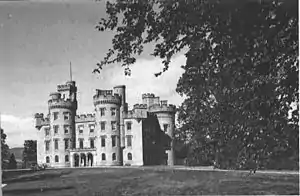John Gordon (soldier)
John Gordon (c.1776 – 16 July 1858) was a Scottish soldier and Tory politician.

Gordon was the son of Charles Gordon of Braid and Cluny, Aberdeenshire, and his wife Johanna Trotter. Gordon became 2nd lieutenant in the Royal Aberdeenshire Light Infantry on 2 December 1800. He was then lieutenant in the 7th Company of the 55th Aberdeenshire Militia on 25 April 1804. In 1804 Gordon made a grand tour of Egypt, carving his name on many ancient monuments. He returned home via Gibraltar where he boarded HMS Victory, which also brought home the mortal remains of Admiral Horatio Nelson. He arrived back in England in December 1805.
Gordon became major on 11 August 1808 and lieutenant-colonel on 6 June 1820.[1]
On the death of his father in 1814, Gordon inherited his estates including Cluny Castle; he was already a wealthy man as he also succeeded to his uncle's estate, who had been a merchant in West India. He purchased further properties, including North and South Uist, Benbecula and Barra. He was described by architectural historian H. Gordon Slade[2] as a "model landlord" to tenants on his Aberdeenshire properties,[3] although he was responsible for the expelling of tenants in the Highland Clearances from the islands.[4] Tenants from his estates on the Outer Hebrides (around 3000 people) were made to emigrate to Canada in 1851. After the British government introduced the Slavery Abolition Act 1833 Gordon received a compensation payment from it of £24,964. His six plantations in the Caribbean island of Tobago had 1383 slaves.[3][5]
Gordon was the Member of Parliament (MP) for Weymouth and Melcombe Regis from 1826 to 1832.[6]
He became an Honorary Colonel in 1836.
Gordon died a bachelor without legal issue in 1858; of his illegitimate children, John Gordon of Cluny, his eldest son, was the only one to outlive him.[3][5] The Cluny estate passed to Lady Emily Gordon Cathcart who continued sending the evictees to Saskatchewan.[4]
References
- Roger O. De Keersmaecker "AN EARLY SCOTTISH TRAVELLER IN EGYPT (In search of John Gordon 1804)"
- "Special collections, Ref: MS 3127". University of Aberdeen. Retrieved 15 November 2013.
- Slade, H Gordon (1981). "Cluny Castle, Aberdeenshire" (PDF). Proceedings of the Society of Antiquaries of Scotland. 111: 454–492.
- Campsie, Alison (3 August 2016). "The man who rid the Hebrides of thousands of men, women and children". The Scotsman. The Scotsman.
- Leadbetter, Russell (28 February 2013). "Secret shame: The Scots who made a fortune from abolition of slavery". The Herald (Glasgow). Archived from the original on 16 November 2013. Retrieved 16 November 2013.
- "Leigh Rayment House of Commons constituencies beginning with W Part 3". Archived from the original on 31 December 2010. Retrieved 21 July 2011.
- GORDON, John (c.1776-1858), of Cluny, Aberdeen, History of Parliament Online
External links
- Hansard 1803–2005: contributions in Parliament by John Gordon
2
| Parliament of the United Kingdom | ||
|---|---|---|
| Preceded by Fowell Buxton William Williams Thomas Wallace, 1st Baron Wallace Masterton Ure |
Member of Parliament for Weymouth and Melcombe Regis 1826–1832 With: Fowell Buxton 1818–37 Thomas Wallace 1818–28 Masterton Ure 1813–32 Edward Sugden 1828–31 Richard Weyland 1831 Charles Baring Wall 1831–32 |
Succeeded by Fowell Buxton Sir Frederick Johnstone, Bt |